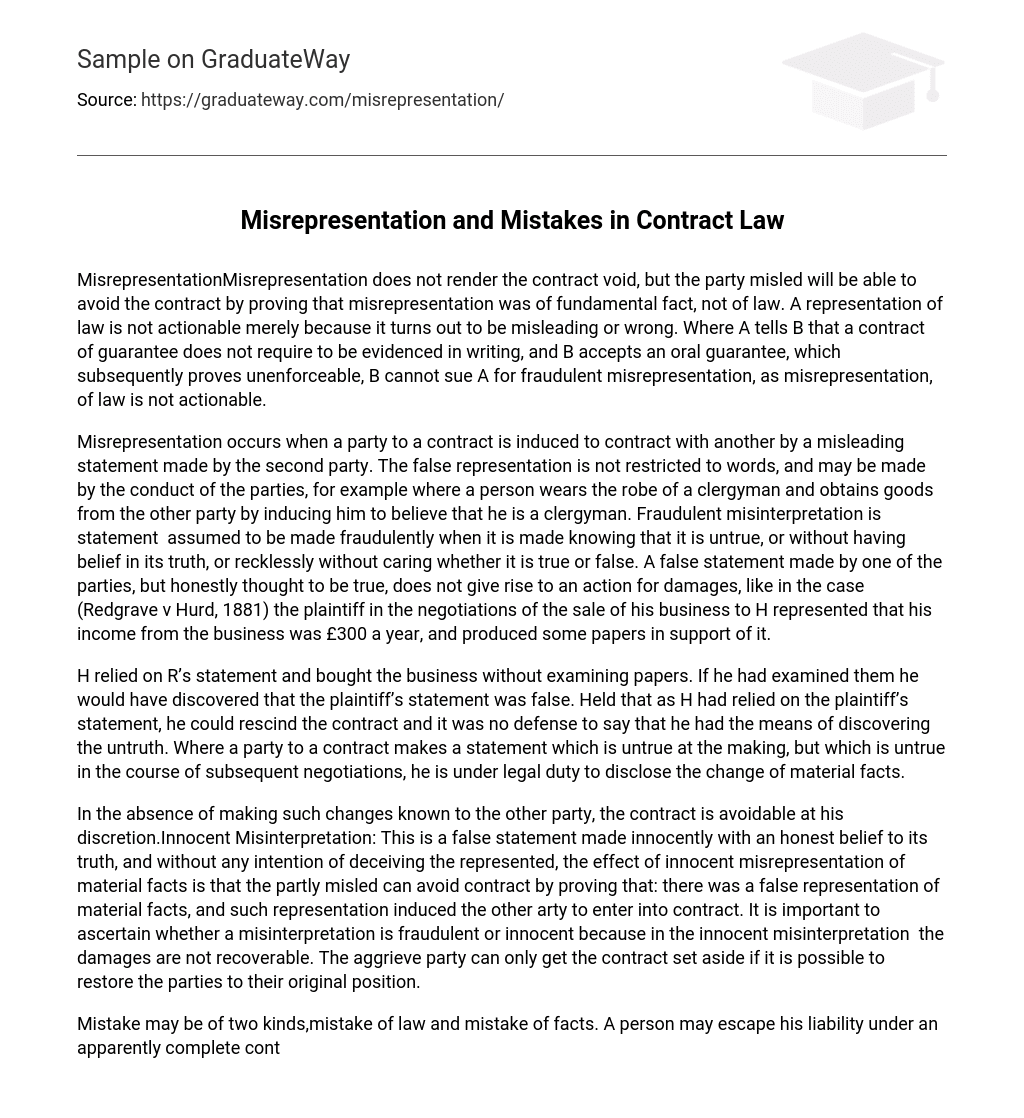MisrepresentationMisrepresentation does not render the contract void, but the party misled will be able to avoid the contract by proving that misrepresentation was of fundamental fact, not of law. A representation of law is not actionable merely because it turns out to be misleading or wrong. Where A tells B that a contract of guarantee does not require to be evidenced in writing, and B accepts an oral guarantee, which subsequently proves unenforceable, B cannot sue A for fraudulent misrepresentation, as misrepresentation, of law is not actionable.
Misrepresentation occurs when a party to a contract is induced to contract with another by a misleading statement made by the second party. The false representation is not restricted to words, and may be made by the conduct of the parties, for example where a person wears the robe of a clergyman and obtains goods from the other party by inducing him to believe that he is a clergyman. Fraudulent misinterpretation is statement assumed to be made fraudulently when it is made knowing that it is untrue, or without having belief in its truth, or recklessly without caring whether it is true or false. A false statement made by one of the parties, but honestly thought to be true, does not give rise to an action for damages, like in the case (Redgrave v Hurd, 1881) the plaintiff in the negotiations of the sale of his business to H represented that his income from the business was £300 a year, and produced some papers in support of it.
H relied on R’s statement and bought the business without examining papers. If he had examined them he would have discovered that the plaintiff’s statement was false. Held that as H had relied on the plaintiff’s statement, he could rescind the contract and it was no defense to say that he had the means of discovering the untruth. Where a party to a contract makes a statement which is untrue at the making, but which is untrue in the course of subsequent negotiations, he is under legal duty to disclose the change of material facts.
In the absence of making such changes known to the other party, the contract is avoidable at his discretion.Innocent Misinterpretation: This is a false statement made innocently with an honest belief to its truth, and without any intention of deceiving the represented, the effect of innocent misrepresentation of material facts is that the partly misled can avoid contract by proving that: there was a false representation of material facts, and such representation induced the other arty to enter into contract. It is important to ascertain whether a misinterpretation is fraudulent or innocent because in the innocent misinterpretation the damages are not recoverable. The aggrieve party can only get the contract set aside if it is possible to restore the parties to their original position.
Mistake may be of two kinds,mistake of law and mistake of facts. A person may escape his liability under an apparently complete contract by proving that he contracted under a mistake of fact and his mistake was so fundamental that it affected the root of the contract. A mistake of law however is no ground for relief from a transaction. Where both the parties to a contract are under a mistake of fact ,the contract is void.
It is necessarily to volunteer information even if there have not been asked in the contract where:When during preliminary negotiations a party makes a statement which is true at that time but becomes false at the time of completing the contract. The statement which was true once will become misinterpretation unless new facts are disclosed to the other party ,When a party makes a statement honestly believing it to be truer, he is under duty to disclose the truth if he later discovers that his previous statement was untrue and when a statement is literally true, but conveys a misleading impression like in the case(With v o’Flanagan, 1936), W was induced to buy F’s medical practice on the representation that it was worth £2,000 a year. The representation was made in January but the contract was completed in May. In the meantime due to F’s illness his income from the practice was not more than £5 a week.
Held that the contract could be avoided owing to F’s failure to disclose the substantial reduction in his practice. Reference1) Hussain (General principles and commercial law (1999)





